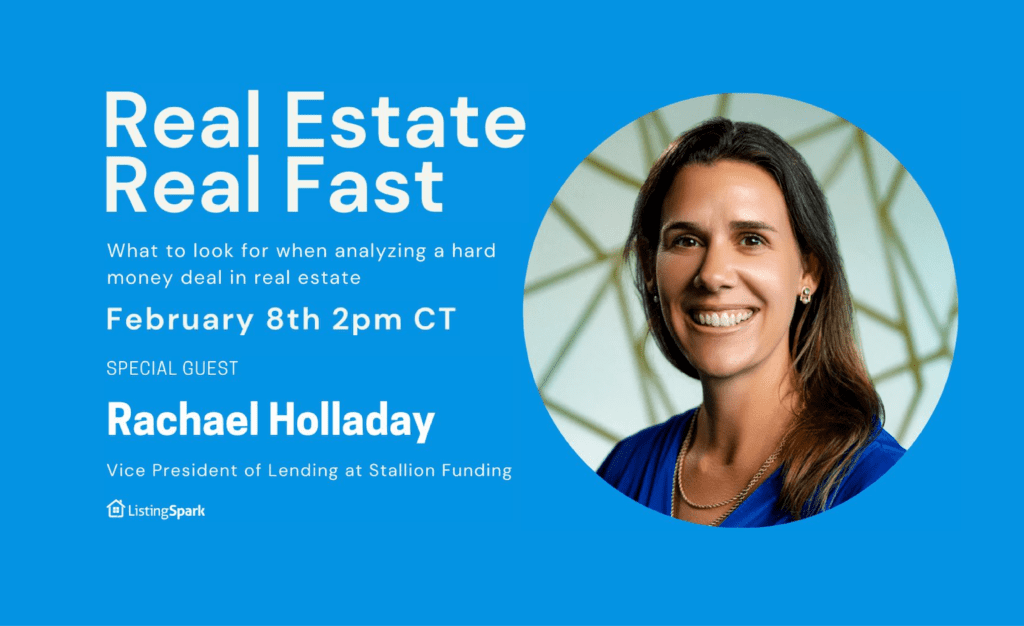
How to master real estate investing and avoid mistakes – Real Estate Real Fast EP14
Episode Summary
Julie Daniels subs in for host Aaron Jistel and Rachael Holladay, VP of Lending at Stallion Funding. Julie and Rachael discuss the importance of access to capital and building relationships with lenders. They also talk about the different types of financing available and how to structure a successful real estate investment.
About Rachael Holladay
Rachael Holladay is the VP of Lending at Stallion Funding, a real estate and hard money lending firm. She has been with the company for 12 years and enjoys helping her clients be successful.
About Stallion Funding
Stallion Funding is a hard money lender offering creative financing solutions for real estate investments and projects. Stallion Funding has established relationships with builders, land developers, and investors in the Austin area. With an expert team of loan officers, Stallion Funding provides loans based on the project and experience rather than credit score.
Episode Highlights
- Tools to help homeowners maximize profits when selling their home
- Requirements for qualifying for a loan with Diversified Lending Solutions
- The importance of relationships with borrowers
- Best practices when it comes to buying land and starting a project
- Adapting to the changing market
- Advice on what a borrower needs to provide in order for their property to be considered for funding
- Best practices when dealing with contractors
- Horror stories from other agents and advice on how to avoid similar pitfalls
- Price points that are most successful for investors
- Advice for new investors looking to grow their business
- Different types of financing available and how to structure a successful real estate investment
Episode Takeaways
[00:02:02] Advice for investors analyzing potential deals
Investors looking to purchase a potential deal should take the time to analyze it, using tools such as sample pro forma spreadsheets and analyzers to determine if there is any money to be made. It’s also wise to seek advice from industry professionals if they are skeptical of the deal. Stallion Funding typically lends about 70% of the value of the property, and if a hard money lender is willing to pick up a deal it can be a good indicator of the deal’s value.
“If someone in this industry is telling you it’s not a good deal, you definitely want to steer away from it.”
[00:03:08] Who does Stallion Funding partner with?
Stallion Funding typically partners with builders and land developers who are doing 1 to 20 specs per year. Rachael also mentioned that they’re still lending on land, which sets them apart from other lenders.
“Most of it is your typical builder, right? We do a lot of stuff with guys in Austin. They’re doing one to 20 specs per year. That’s kind of what we do most of our business with.”
[00:04:04] Qualifying for a loan with Stallion Funding
Rachael explains the requirements for qualifying for a loan with her company. She states that the first questions she will ask are related to the project itself, such as what is being bought, what it will be used for, and what it will be sold for. Other factors she considers include experience, liquidity, and bank statements. Additionally, she recommends that the borrower has done some projects before in order to gain knowledge of what can go wrong.
“We want to make sure that they have the liquidity enough to kind of carry themselves through the project.”
[00:05:43] How Stallion Funding builds relationships with investors
Rachael explains the importance of relationships with Stallion Funding’s borrowers. She emphasizes the availability of her cell phone, which is never off limits. Additionally, they have the ability to be flexible and creative with financing to be more of a true partner to investors, setting them apart from other lenders.
“We really want them to be honest with us about what’s going on with their projects. We want them to feel like we’re a team.”
[00:07:30] Real estate investing best practices and tips from Rachael Holladay
Rachael suggests having a mentor and being prepared for a 10% discrepancy in the budget and timeline for new investors. She also recommends documenting everything and getting mechanics, lean waivers, etc. so that when you do go to sell the property, you’re ready to be able to make sure you’ve got real title to sell it.
“Make sure you’ve got either some capital put away for [discrepancies] or you’ve got some kind of an avenue that you can go to if there is some overrun and cost or if it takes 10% longer than what you thought it was going to take.”
[00:10:59] How Stallion Funding is adjusting lending to the changing market
Rachael discusses how they have been adapting to the changing market by making sure their loan to value ratios match the realistic value of the property and making sure that their exit strategies are fully understood.
“If there’s any other options that we can offer a client, [we] see if there’s a way that we can help with some of that too.”
[00:12:41] Stallion Funding is cautiously optimistic about the market
Rachael is cautiously optimistic about the real estate market despite signs of improvement. She and her team are diversifying their business by purchasing short term rental properties while helping clients with lending, buying, and selling.
“As long as you’re kind of using common sense with those things, you should be very successful because it’s the business that’s been around, it’s going to stay around and the market is going to stay very strong.”
[00:15:27] What does a borrower need to provide to get their investment property funded?
Rachael discusses what a borrower needs to provide in order for their property to be considered for funding. She explains that the location, amount being put into it, and what it’s expected to sell for are all important pieces of information needed to vet out the deal. Additionally, she notes that with the right relationships, the time frame for closing can be as quick as one to two weeks.
“So tell me, what is it you’re buying, how much are you putting into it and what do we think it’s going to sell for? Those three things help me get to what I think our loan to value ratio could be and what it looks like you would have to bring to closing.”
[00:18:06] Best practices for dealing with contractors for investors
According to Rachael, the most important thing is to double check everything and get mechanics lien waivers if necessary. Contractors can have some weird accounting measures so you want to make sure they have paid who they need to for something that’s being done on one of your projects.
“I mean, there’s been a lot of times where contractors will take funds from one project and put them into another project. I’m not always saying it’s an unethical decision that they’ve made to do that. Sometimes it’s just accounting. You want to make sure if you have assumed you have paid somebody for something that’s being done on one of your projects, make sure that it has been paid for.”
[00:19:18] Real estate investing horror stories
Rachael has seen horror stories where contractors submit fraudulent invoices and not do the work that was expected.
“Contractors can definitely be funny, but when you find a good one, you have to stick with them because then they’re very committed.”
[00:22:36] Price point range most successful for investors right now
Rachael suggests that in areas like Liberty Hill, anything from $450,000 to $900,000 is a good idea, while in Austin areas above $1.2M are getting hit harder. She also recommends sticking to the $600,000-$1M range in certain areas, and avoiding large $3 million specs.
“So as long as you’re sticking in, you know, 600,000 to a million dollar price range in certain areas, I think you’re probably still okay.”
[00:24:59] Advice for new investors looking to grow their business
Rachael emphasized the importance of building up a trusted rolodex of vendors and lenders, as well as asking for advice from other experienced professionals in the industry.
“Really great thing about our community here is people are always really willing to share some help and feedback and to help kind of educate people, right. Take advantage of that and learn from other people.”
Related Posts
4 Strategies for Selling Your Home Without a Realtor
Texas is a great place for real estate investors and homeowners looking to sell. For one, you’re not required to have a real estate attorney present during a transaction. In fact, homeowners can sell their…
Is The House-Flipping Boom Over for Investors?
Over the past decade, house flipping has drawn in both seasoned real estate investors and ambitious newcomers, lured by the promise of turning fixer-uppers into fast profits. And why not? The idea of buying low,…
Is Now the Right Time to Sell Your Home in Texas? An In-Depth Analysis
Thinking about selling your home in Texas? You’re not alone. The Lone Star State’s housing market is shifting, and many homeowners are wondering whether now is the right time to make a move. The latest…




